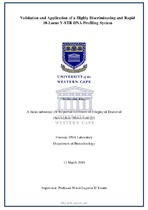Validation and application of a highly discriminating and rapid 10-locus Y-STR DNA profiling system
Abstract
DNA profiling the male specific region on the Y-chromosome is fundamental to forensic practise. Its recognised as a powerful analytical tool for investigation of sexual assault when the DNA evidence is highly admixed. Standard practises for processing sexual assault evidence include physically separate the sperm cell from the female fraction using differential extraction followed by autosomal DNA profiling. However, under specific scenarios of assault physical separation may not be possible due to the nature of the evidence.
The research presented in this thesis was focused on the development and validation of the UniQTyper™ Y-10 prototype for male specific DNA profiling. The prototype which contains 10 Y-STR markers was developed and validated to deliver a rapid and cost-effective system while maintaining a forensic applicable level of performance. An allelic ladder is produced with an allele cloning approach for which an overview of the workflow and technicalities presented herein is aimed to assists an efficient bulk production process.
In a second component novel sequence variation was reported across 153 sequenced alleles and submitted to Genbank. In this output the Y-STR panel was perused beyond the scope of length polymorphisms. In a proof of concept, its potential to discriminate between shared allele sizes by characterizing sequence structure variations is discussed.
In a final component we generate the largest Y-STR survey across South Africa to establish reference data and to comprehensively assess the forensic genetics parameters for the UniQTyper™ Y-10.

